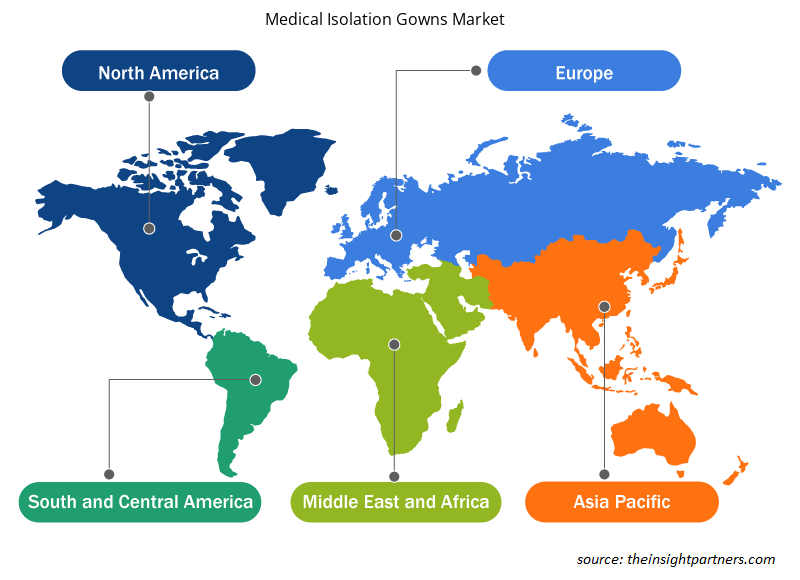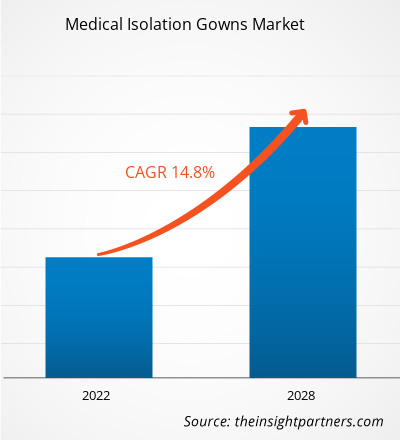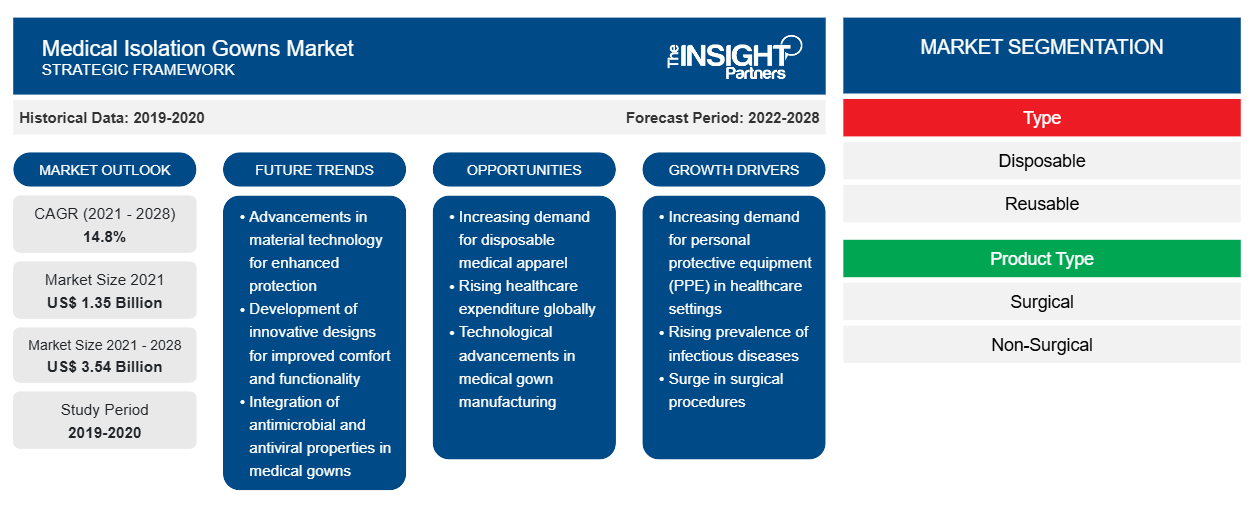Si prevede che il mercato dei camici isolanti medici raggiungerà i 3.542,78 milioni di dollari entro il 2028, rispetto ai 1.346,31 milioni di dollari del 2021; si stima che crescerà a un CAGR del 14,8% dal 2021 al 2028.
Il rapporto offre approfondimenti e analisi approfondite del mercato dei camici per isolamento medico , sottolineando vari parametri, come tendenze e opportunità di mercato, dinamiche di mercato e analisi del panorama competitivo dei principali attori del mercato in Nord America, Europa, Asia Pacifico, Sud e Centro America e Medio Oriente Africa. Include anche l'analisi dell'impatto della pandemia di COVID-19 nelle regioni.
Personalizza questo report in base alle tue esigenze
Riceverai la personalizzazione gratuita di qualsiasi report, comprese parti di questo report, o analisi a livello nazionale, pacchetto dati Excel, oltre a usufruire di grandi offerte e sconti per start-up e università
-
Scopri le principali tendenze di mercato in questo rapporto.Questo campione GRATUITO includerà analisi di dati che spaziano dalle tendenze di mercato alle stime e alle previsioni.
Approfondimenti di mercato
Aumentare la consapevolezza sulle infezioni contratte in ospedale
I pazienti contraggono infezioni nosocomiali o infezioni nosocomiali (HAI) mentre ricevono servizi sanitari in un ospedale o in qualsiasi altra struttura sanitaria. Patogeni comuni, come batteri, virus, funghi e parassiti, causano queste infezioni. Le HAI includono infezioni del tratto urinario nosocomiale nosocomiale, infezioni del sito chirurgico (SSI), infezioni del flusso sanguigno nosocomiale nosocomiale nosocomiale, polmonite nosocomiale ...
Le infezioni associate all'assistenza sanitaria hanno un tasso di morbilità e mortalità elevato e costano al sistema sanitario miliardi di dollari ogni anno. I Centers for Disease Control (CDC) hanno riferito che le infezioni associate all'assistenza sanitaria sono responsabili di circa 1,7 milioni di casi di infezione e 99.000 decessi ogni anno negli ospedali americani. I camici isolanti sono obbligatori da utilizzare durante qualsiasi procedura medica nelle strutture sanitarie. Aiutano a prevenire la contaminazione incrociata, il trasferimento di fluidi corporei e qualsiasi microorganismo che causa infezioni e la penetrazione di liquidi. Le agenzie governative, come il National Healthcare Safety Network (NHSN) del Center for Disease Control and Prevention (CDC), monitorano attentamente le infezioni che aiutano a prevenire le infezioni associate all'assistenza sanitaria e a migliorare la sicurezza dei pazienti. Negli Stati Uniti, il Department of Health and Human Services (HHS) lavora per ridurre i casi di infezioni associate all'assistenza sanitaria. Inoltre, in Europa, l'Healthcare-Associated Infections Surveillance Network (HAI-Net) monitora queste infezioni nella regione e la funzione dell'HAI-NET è gestita e controllata dall'European Centre for Disease Prevention and Control (ECDC). Ad esempio, un sondaggio intitolato “Consapevolezza delle infezioni ospedaliere tra gli studenti di medicina in un centro di assistenza terziaria” ha riportato che un totale dell’82% (su 250) di studenti era a conoscenza delle infezioni ospedaliere.
Informazioni basate sul tipo
In base al tipo, il mercato dei camici da isolamento medico è diviso in monouso e riutilizzabili. Il segmento monouso ha detenuto una quota maggiore del mercato nel 2021. Tuttavia, si stima che il segmento riutilizzabile registrerà un CAGR più elevato del 15,5% nel mercato durante il periodo di previsione.
Informazioni basate sul tipo di prodotto
In base al tipo di prodotto, il mercato dei camici da isolamento medico è diviso in chirurgico e non chirurgico. Il segmento chirurgico ha detenuto una quota maggiore del mercato nel 2021. Tuttavia, si stima che il segmento non chirurgico registrerà un CAGR più elevato del 15,1% durante il periodo di previsione.
Le strategie inorganiche, come fusioni e acquisizioni, sono comunemente adottate dalle aziende per soddisfare le mutevoli richieste dei clienti e mantenere i loro marchi in tutto il mondo. I player che operano nel mercato dei camici per l'isolamento medico adottano anche strategie organiche, come il lancio e l'espansione del prodotto, per estendere la loro presenza e il portafoglio prodotti in tutto il mondo, nonché per soddisfare la crescente domanda.
Approfondimenti regionali sul mercato degli abiti da isolamento medico
Le tendenze regionali e i fattori che influenzano il mercato Medical Isolation Gowns durante il periodo di previsione sono stati ampiamente spiegati dagli analisti di Insight Partners. Questa sezione discute anche i segmenti e la geografia del mercato Medical Isolation Gowns in Nord America, Europa, Asia Pacifico, Medio Oriente e Africa e Sud e Centro America.

- Ottieni i dati specifici regionali per il mercato degli abiti da isolamento medico
Ambito del rapporto di mercato sui camici da isolamento medico
| Attributo del report | Dettagli |
|---|---|
| Dimensioni del mercato nel 2021 | 1,35 miliardi di dollari USA |
| Dimensioni del mercato entro il 2028 | 3,54 miliardi di dollari USA |
| CAGR globale (2021 - 2028) | 14,8% |
| Dati storici | 2019-2020 |
| Periodo di previsione | 2022-2028 |
| Segmenti coperti |
Per tipo
|
| Regioni e Paesi coperti |
America del Nord
|
| Leader di mercato e profili aziendali chiave |
|
Densità degli attori del mercato degli abiti da isolamento medico: comprendere il suo impatto sulle dinamiche aziendali
Il mercato dei camici da isolamento medico sta crescendo rapidamente, spinto dalla crescente domanda degli utenti finali dovuta a fattori quali l'evoluzione delle preferenze dei consumatori, i progressi tecnologici e una maggiore consapevolezza dei benefici del prodotto. Con l'aumento della domanda, le aziende stanno ampliando la propria offerta, innovando per soddisfare le esigenze dei consumatori e capitalizzando sulle tendenze emergenti, il che alimenta ulteriormente la crescita del mercato.
La densità degli operatori di mercato si riferisce alla distribuzione di aziende o società che operano in un particolare mercato o settore. Indica quanti concorrenti (operatori di mercato) sono presenti in un dato spazio di mercato in relazione alle sue dimensioni o al valore di mercato totale.
Le principali aziende che operano nel mercato dei camici isolanti medici sono:
- Cardinal Health, Inc.
- Medline Industries, Inc.
- Prodotti sanitari Leboo Limited
- Narang Medical Limited
- Società medica di Shanghai
Disclaimer : le aziende elencate sopra non sono classificate secondo un ordine particolare.

- Ottieni una panoramica dei principali attori del mercato degli abiti da isolamento medico
Per tipo
- Monouso
- Riutilizzabile
Per tipo di prodotto
- Chirurgico
- Non chirurgico
Per utente finale
- Ospedali
- Centri chirurgici ambulatoriali
- Cliniche
- Altri
Per Geografia
-
America del Nord
- NOI
- Canada
- Messico
-
Europa
- Serbia
- Regno Unito
- Russia
- Polonia
- Estonia
- Lituania
- Svezia
- Slovacchia
- Finlandia
- Germania
- Francia
- Italia
- Spagna
- Resto d'Europa
-
Asia Pacifico
- Cina
- Giappone
- India
- Australia
- Corea del Sud
- Resto dell'Asia Pacifica
-
Medio Oriente e Africa
- Emirati Arabi Uniti
- Arabia Saudita
- Africa
- Resto del Medio Oriente e Africa
-
America del Sud e Centro
- Brasile
- Argentina
- Resto del Sud e Centro America
Profili aziendali
- Cardinal Health, Inc.
- Medline Industries, LP
- Prodotti sanitari Leboo Limited
- Narang Medical Limited
- Società medica di Shanghai
- Assistenza sanitaria Mölnlycke AB
- Assistenza sanitaria Advin
- Dispotech S.r.L.
- Azienda tessile standard
- PRIONTEX
- Società a responsabilità limitata Sara Healthcare Pvt. Ltd.
- Analisi storica (2 anni), anno base, previsione (7 anni) con CAGR
- Analisi PEST e SWOT
- Valore/volume delle dimensioni del mercato - Globale, Regionale, Nazionale
- Industria e panorama competitivo
- Set di dati Excel
Report recenti
Rapporti correlati
Testimonianze
Motivo dell'acquisto
- Processo decisionale informato
- Comprensione delle dinamiche di mercato
- Analisi competitiva
- Analisi dei clienti
- Previsioni di mercato
- Mitigazione del rischio
- Pianificazione strategica
- Giustificazione degli investimenti
- Identificazione dei mercati emergenti
- Miglioramento delle strategie di marketing
- Aumento dell'efficienza operativa
- Allineamento alle tendenze normative























 Ottieni un campione gratuito per - Mercato dei camici per l'isolamento medico
Ottieni un campione gratuito per - Mercato dei camici per l'isolamento medico